Online/Digital Streaming Media
My Unorthodox Life’s Ra’ed Saade dishes up Reality TV spunk
Is America’s Reality TV genre ready for frank discussions on open relationships?
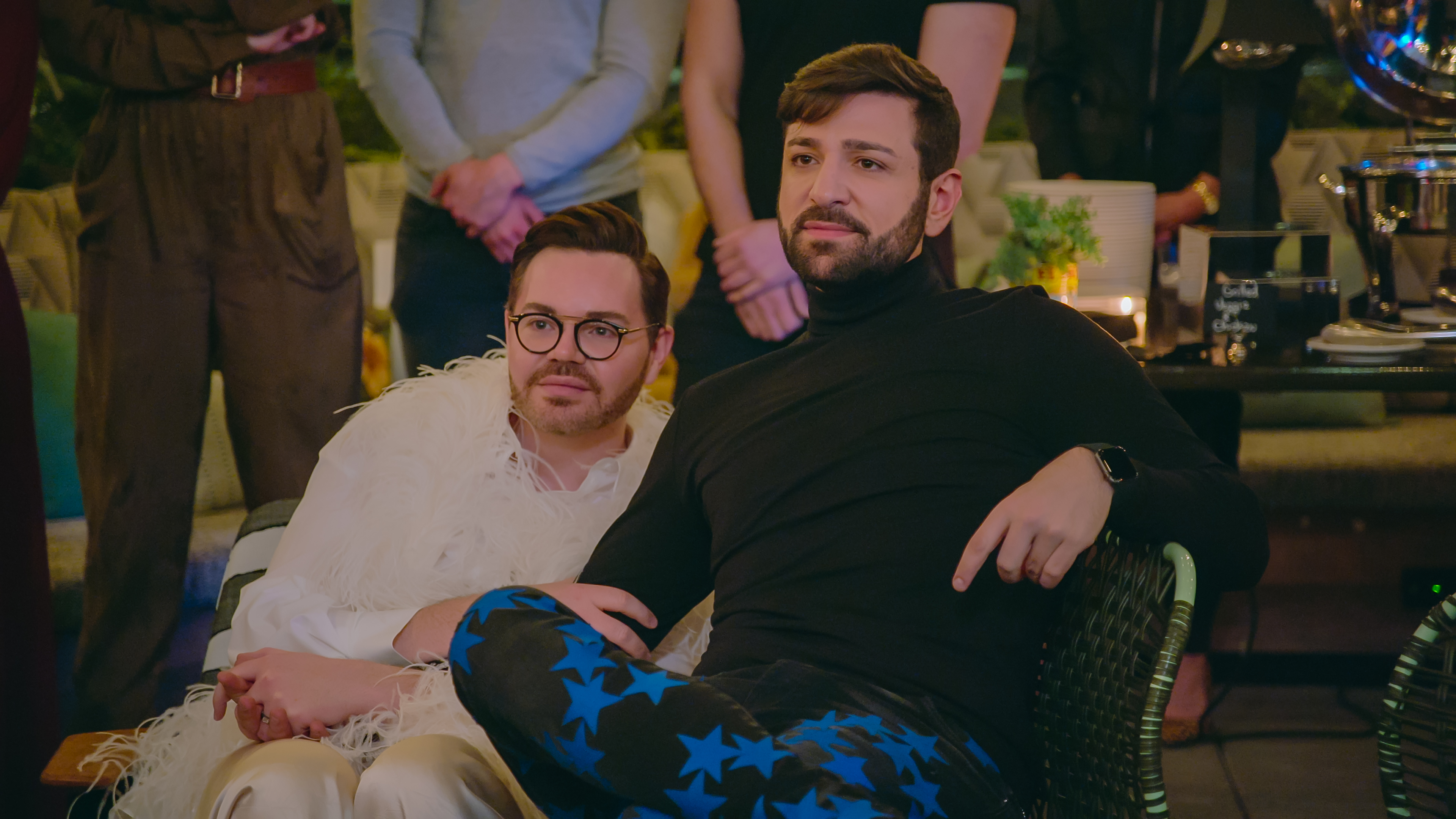
HOLLYWOOD – If you are like many who have reacted harshly to Real Friends of WeHo, you may feel a bit hopeless regarding reality television and its representation of gay men.
For all its misses, the reality TV genre still explodes across broadcast and streaming services. There are endless contests, there are weird matchmaking gimmicks and through it all, you can still find some gay fingerprints. And of course, there is Drag Race.
One of my personal guilty pleasures has been various “Real Housewives” franchises. Each franchise seems to study the behaviors of women who possess big egos, lots of money and are plied with a sloshing amount of alcohol. Sitting back in an armchair, shoveling popcorn and watching, is gay man, and executive producer, the boss and god of the Real Housewives world, Andy Cohen… (and oh yeah, me.) There is a perverse pleasure observing a hetero world where the Higher Power is gay and watching them all descend into madness.
It is all theatrical and somewhat staged, of course. We are the fourth wall of their world, and situations are played out and exaggerated for our benefit, and from the accounts of the people we are observing, only represent a fraction of their real lives.
Against this backdrop, Netflix’s My Unorthodox Life plays on this voyeuristic concept but is refreshingly unique and insightful. While it certainly has Real Housewives trappings, it centers around the uber-wealthy and has even had Jill Zahn, an OG New York Real Housewife, drop in to give advice, the core is less about superficial squabbles and more about cultural oppression and the quest for personal empowerment.
The show centers around Julia Haart. Her life is literally “unorthodox” as her story arc describes her escape from the orthodox lifestyle of the ultra-conservative Haredi Jewish Community in Monsey, New York. In season one, three of her four children follow her and she mentors them into living life in the secular world as they each make personal strides to find their own unique identities. Julia herself becomes a fashion and design mogul, married to an incredibly wealthy husband Silvio Scaglia Haart, and best friend to her gay business partner, Robert Brotherton. Robert and Julia could not be more “Will and Grace” if they tried. Julia ends season one trying to matchmake Robert and find him true love. Apparently, she did not need to bother, as he had already been working on something off camera on his own.
As the sun rises on season two, we see seismic shifts have been made in the relationship statuses of the cast. Julia is now going into a divorce war with Silvio, and her oldest daughter has left her husband and their marriage which had been originally rooted in Haredi orthodox standards. Robert on the other hand, is no longer single, but has a boyfriend, with whom he has had a seven-year relationship.
Enter Ra’ed Saade, the boyfriend. Handsome and positive with a killer smile, he is somehow reminiscent of a male, Lebanese, gay Mary Richards as Lou Grant defined her in the classic sitcom.
Lou: You know what? You’ve got spunk…
Mary: Yeah, well (slight giggle)
Lou: I HATE spunk!
Ra’ed has spunk. In every sense of the word—double entendre intended. Will America “hate” his brand of spunk?
Mary, in her day, was one of the only single working women representations on network TV. Ra’ed is the first gay Arab man on Netflix reality TV. He is sex positive and allows himself to be a walking commercial for open relationships. On the show, he mixes a deep sense of romance and being the ultimate boyfriend, a superior friend and confidant, with being frequently horny, or as he himself describes it, “a slut.”
Ok, so maybe Mary Richards never called herself a slut.
While Ra’ed is from Lebanon, he seems to have lived elsewhere most of his life. This is not unusual, he tells me, “The majority of the population of Lebanon live outside. We have more Lebanese people in Brazil than there are in Lebanon.” Ra’ed was born in Dubai, moved to the Philippines, lived in Holland, and then spent his high school years in Saudi Arabia. He credits those high school years as being the ones that shaped him. “Saudi Arabia is a very conservative, Muslim country. There is when I discovered that I was a homosexual gay man. Surviving three years in Saudi Arabia as a homosexual man and keeping it to myself, acting and putting on… doing all the things you do when you’re acting to cover up. That shaped a lot of things for me in my life. All the trauma of that period made me into this funny guy that knows, if I survived that, I could survive anything… I was considered an abomination and could have gotten up to the death penalty, especially in Saudi Arabia, and especially during the time that I was there. It was very frightening and scary. I didn’t tell a soul other than the people I was sleeping with, of course they knew.”
When he came to America and Syracuse University, everything changed. He met Robert. “It was like, opening a cave and letting the puppy come out. I smelled freedom. I felt I saw the rainbow colors in the sky every day. I just obviously fell in love. And here I am. I feel like I’ve arrived.”
It was with that survival instinct that gave him the courage to go for the Middle East edition of The Voice, and to audition for America’s Got Talent. When he hit the AGT stage, the audience loved his personality. His act? Not so much. He got booed off.
Spunk.
In the second season of My Unorthodox Life, Ra’ed and Robert starred in the first episode describing how they were living together. While the show misleadingly implied that their relationship was new, it was not only not new, but tried and true. “Rob and I have been soul mates for 16 years. We know each other through thick and thin, through rich and poor, famous and non-famous and good and bad. All of it. We know each other inside and out,“ Ra’ed told me on a recent Rated LGBT Radio discussion.
Haart’s eldest daughter Batsheva was harsh when Ra’ed revealed that he believed in open relationships. She advocated for the couple to break up immediately. She made her comments right to Ra’ed’s face on camera.
He has no regrets. “I’m such an open book and it’s sometimes bad for me… I didn’t have any hesitation because I stopped caring what people think and I am shameless, as you’ve seen on many shows. I just know the truth that is the truth,” Ra’ed said to me about his stance. “The truth of the matter is Rob and I have been together as friends as you know, sexually active or whatever for 16 years, I mean, there is no doubt the loyalties– the love, is there. There’s no doubt that I would jump off a cliff, I would take a bullet for Rob. All of these beautiful things– but when I’m going to Ibiza …Rob and I are going to go and flirt with everybody in the club. A lot of people do that in secret. It is okay to have an open relationship when you are honest and open with your partner and you guys have set the ground rules and you both are saying, yes, we agree, both say yes, we love, we love this idea. There’s no problem with this and it’s a way more fun lifestyle. I mean that’s the truth. When you’re in a relationship, you are together to lift each other up encourage each other and just build a beautiful life. You just don’t own another person, you know.”
Hi answer is direct, unapologetic and almost innocent. Spunk.
Will there be a season three of My Unorthodox Life? Ra’ed hopes so. “The assignment was my unorthodox life.” Even if season two was the final he feels “like I completed the assignment.” If there are more seasons, “There’s a lot of facets and a lot of a lot of dynamics in my life that are unorthodox so I would love to open up more in coming seasons.”
In the meantime, while Mary Richards famously twirled and threw her hat in the air on a Minneapolis street corner, Ra’ed is tossing his on a New York City Time Square street corner.
It is from there that he TikTok promotes his February 10th “Club Ra’ed” DJ evening of Middle East disco sounds, a one-time event he hosts. He has proven that spunk is alive and well.
The modern version is just a tad more exciting with a unique Arabic feel and a fun infectious rhythm.
Listen to the complete interview:
****************************************************************************
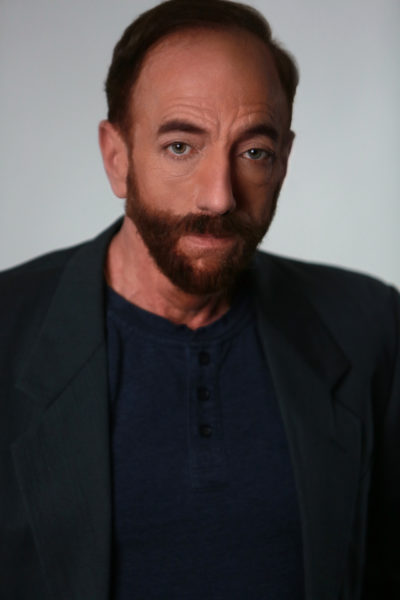
Rob Watson is the host of the popular Hollywood-based radio/podcast show RATED LGBT RADIO.
He is an established LGBTQ columnist and blogger having written for many top online publications including Parents Magazine, the Huffington Post, LGBTQ Nation, Gay Star News, the New Civil Rights Movement, and more.
He served as Executive Editor for The Good Man Project, has appeared on MSNBC and been quoted in Business Week and Forbes Magazine.
He is CEO of Watson Writes, a marketing communications agency, and can be reached at [email protected] .
Online/Digital Streaming Media
LGBTQ youth love TikTok. Does TikTok love them back?
Platform’s algorithm found to promote homophobia, violence
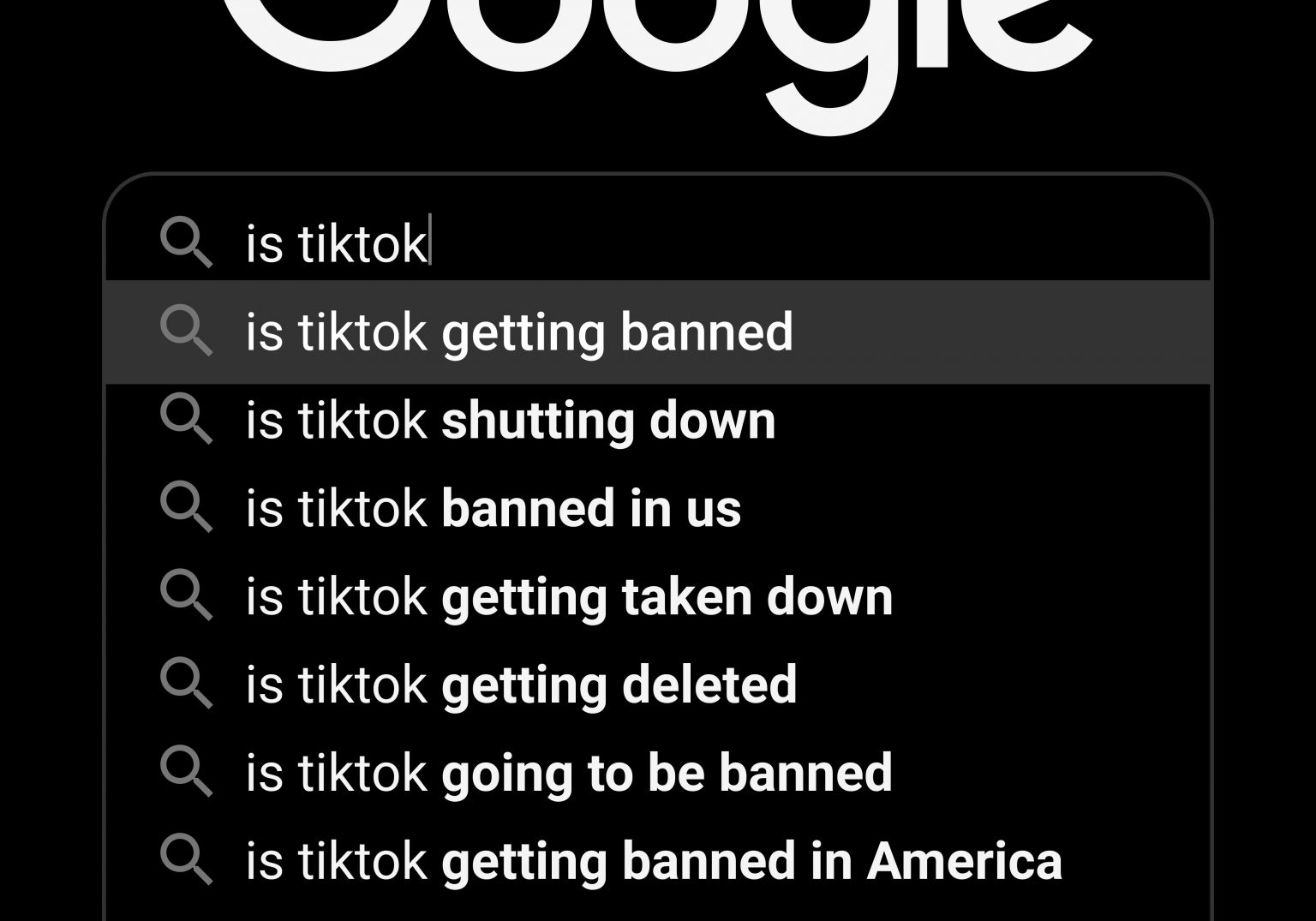
When Jocelyn was stuck inside during most of 2020, they did what any high school senior would do: scrolled through TikTok. They found themself on the hashtag #tiktokmademegay a lot. (To protect privacy, the Blade is opting to only use Jocelyn’s first name).
“At the time, I didn’t give it a lot of thought,” they say, acknowledging that most users viewed it as “more of a joke.”
Now a senior in college, where Jocelyn will graduate with a degree in Women’s, Gender, and Sexuality Studies and Computer Science this spring, they have a more nuanced perspective. Nuanced enough to embark on a year-long independent thesis on the topic.
They still get that the hashtag is a joke, but probe into what lies behind it, noting a tension between the “the born-this-way narrative of sexuality essentialism” to the idea that “sexuality is socially constructed.” They also question the power this narrative gives to TikTok in its ability to surveil user data and identity.
What got Jocelyn so interested in it in the first place was the fact it was a conservative talking point being replicated by the queer community. Because, what amounts to a joke or an intellectual query for some, is a point of anxiety and fear-mongering for others.
The conservative think tank known for writing Project 2025, the Heritage Foundation wrote “How Big Tech Turns Kids Trans” arguing that “Digital spaces are ever more designed to promote sexual and transgender content.” This argument has incredible staying power and has been echoed by numerous far-right pundits like Oli London and Charlie Kirk.
It has also been referenced by lawmakers. Tennessee Sen. Marsha Blackburn (R) stated the Kids Online Safety Act (KOSA), bi-partisan legislation she co-sponsored restricting youth access to social media, was meant to “protect minor children from the transgender [sic] in our culture.”
TikTok has faced numerous challenges over the years. From Montana’s currently unsuccessful ban on use in its state to the “divest-or-ban bill” signed by President Joe Biden in April or the lawsuit brought by more than a dozen attorneys general in October—it is clear there is a broad coalition of U.S. lawmakers concerned about the app.
These acts—which cite both national security and youth mental health—come in conjunction with a larger movement to limit youth access to social media—locally, nationally, and internationally.
Data security experts and some legislators state that the national security risk of the app is only hypothetical due to the fact TikTok houses U.S. user data in the states. There are pressing concerns about the safety of user data, explains Shae Gardner, the policy director at LGBT Tech. Focusing those concerns entirely on one platform due to a hypothetical risk rather than the widespread, real risks across multiple platforms is disingenuous.
“Proponents [of this ban] have been saying that this is urgent and necessary to protect the data of Americans,” says Gardner, “But we have been asking for years for nationwide data privacy protections, and watching the efforts die over and over again on the legislative vine.”
In fact, Gardner argues, “Regulating one application is both legally dubious and will ultimately be ineffective in doing so.” Gardner explains that though LGBT Tech is not involved in any legislation against the ban, which other tech policy groups are, they hold the shared belief that it is unconstitutional to target a single platform rather than the wider ecosystem.
The risk to youth mental health, which has also been cited as a major concern, is more complicated. Best sellers like the highly critiqued “The Anxious Generation” argue that all youth mental illness is linked to social media. The data doesn’t back this up, argue numerous experts.
Amid the panic, LGBTQ advocates have passionately argued that queer youth’s access to technology is uniquely beneficial due to a lack of education and community in the physical world. The Trevor Project identified TikTok as the platform where LGBTQ youth felt most “safe and understood.”
Data largely backs this up. A systematic review from 2022 found that “social media may support the mental health and well-being of LGBTQ youths through peer connection, identity management, and social support.” The review noted that more research is needed, noting that their results may be limited by weak evidence due to factors like small sample sizes.
Celia B. Fisher, the Marie Ward Doty University Chair in Ethics at Fordham University, was able to gather a larger sample by conducting a national survey of more than 500 on Instagram. With that reach, explains Fisher, “you’re more likely to get a fuller view of what’s going on nationally.”
“There’s an anonymity with national surveys,” adds Fisher, “[It] brings different people to answer questions that they may not want to talk about to somebody in person.”
In March 2024, she published the peer-reviewed article “Social media: A double-edged sword for LGBTQ+ youth” in the Journal “Computers in Human Behavior.” Many results agreed with the larger narrative of online spaces as refuges and community-building spaces. “It’s a wonderful place when they can find the appropriate sites,” says Fisher.
Jocelyn, the student researcher, echoes this. “Many of the videos I have come across discuss how the comfortability of the queer spaces on TikTok was part of the reason they felt comfortable enough to come out and explore their sexuality.”
When youth drift into non-welcoming territory, the story is different.
Fisher’s research finds that more than 80% of youth are exposed to discrimination either directly or vicariously (watching others being discriminated against) in the last month. Fisher wrote, “between 40% and 63% of all youth met the criteria for moderate levels of depression, anxiety, and substance use disorder (SUD).” Youth who described high exposure to discrimination had higher levels of depression, anxiety, and SUD.
The hate does not simply come from the run-of-the-mill bully finding a classmate online. “Algorithms expose them to these things,” says Fisher.
“If an algorithm sees that you’re interested in RuPaul… Then it begins its work on figuring out other sites that may be attached to similar interests. But as it moves on, it begins to add the heterosexist and transphobic types of posts.”
The fact that the algorithms that govern our tech can be sexist, racist, and homophobic is old news and highly studied, but it continues to have compounding impacts. Media Matters for America found in 2021 that TikTok’s algorithm specifically promotes homophobia and anti-trans violence.
Jocelyn also worries about handing over the power of identification and community to an algorithm. In addition to the #tiktokmademegay, other users promote the idea that “TikTok knows things about themself before they know it.” This rhetoric is “scary” says Jocelyn, because “handing over the keys of self-identification to an algorithm that we have no idea how it works is not something that feels right.”
Gardner echoes the complex views on the state of social media. Outside of her day job as a policy maven, Gardner is a TikToker under the handle @shaeitaintsoo, where she shares educational content about LGBTQ issues.
“These spaces also allow for a lot of queer joy and a lot of authenticity in a way that makes me proud to be a part of this community,” she says. At the same time, backlash is part of the job. The success of TikTok’s moderation has ebbed and flowed during her four years as a public figure on the app.
Gardner emphasizes that “hatred and harassment do not live in algorithms.” The discrimination faced online is replicated bigotry from offline spaces. Social media can amplify and distribute the bigotry in new ways. “It is the responsibility of the platforms to be making significant efforts to ensure that the replication is not then also multiplied and made ten times worse.”
Gardner sees the backlash as a “tale as old as time” that has been replicated without much evidence onto emerging technology. “I’m not saying that tale is not rooted in some element of truth. But this, this didn’t start with TikTok, I would push back against language that seems to think it will end with TikTok.”
In the meantime, Gardner implores those worried to not lose sight of the most important concerns.
“If your concern is that [kids and teens] are spending too much time in online spaces. What are you doing to create safe, physical ones for them?” Gardner asks.
(This story is part of the Digital Equity Local Voices Fellowship Lab through News is Out. The lab initiative is made possible with support from Comcast NBCUniversal.)
Arts & Entertainment
Lesbian comic/activist Robin Tyler gets a long overdue ‘Outstanding’ Netflix spotlight
Pioneering LGBTQ+ Activist and Comedian Reflects on Career, Marriage Equality, and Ongoing Fight for Rights
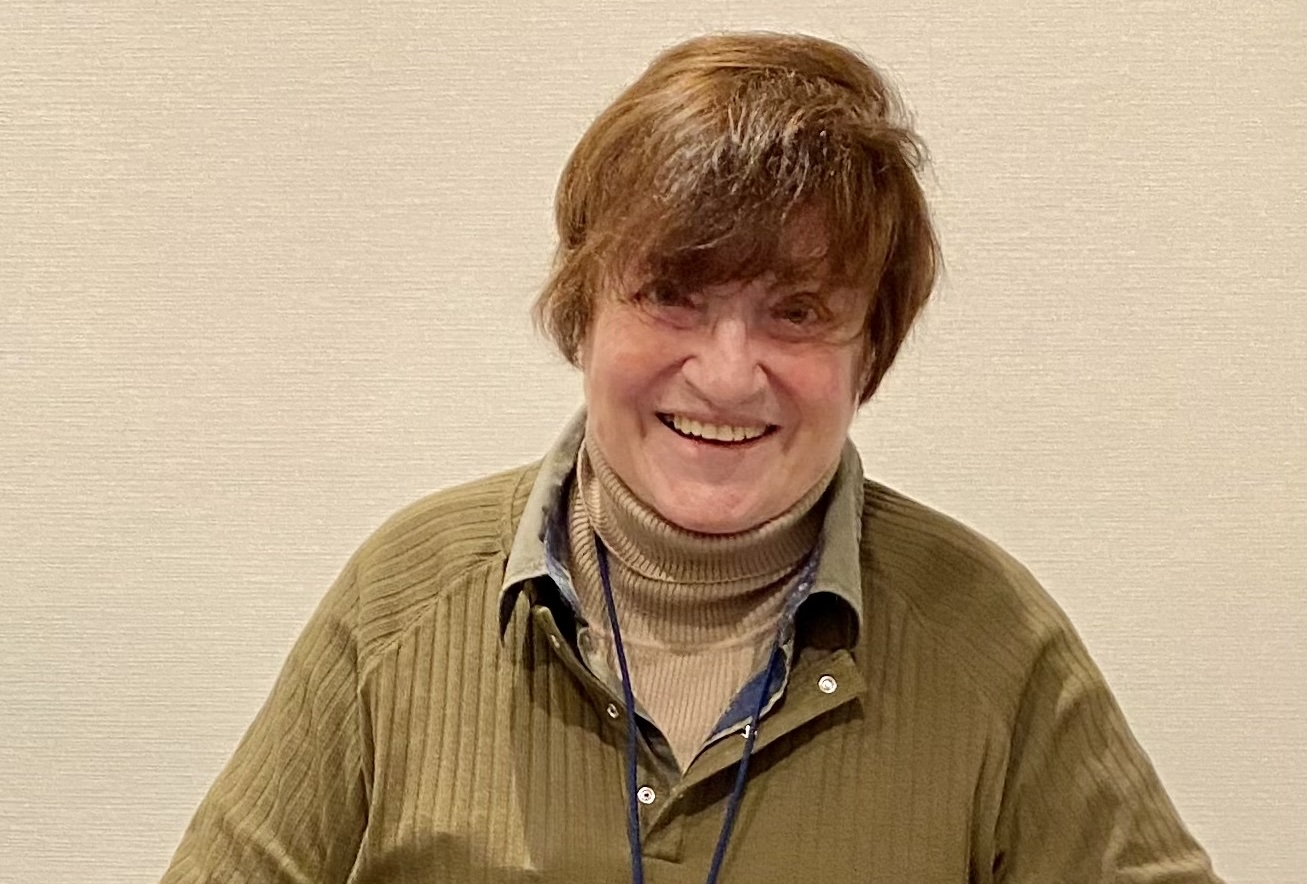
In the new Netflix documentary “Outstanding: A Comedy Revolution” – now streaming on the Netflix platform – filmmaker Page Hurwitz takes viewers behind the scenes of a landmark 2022 performance featuring an all-star lineup of queer stand-up comedians. She also reveals the powerful queer activism that has been pushing mainstream boundaries over the past five decades and beyond through a collection of out-and-proud comics that reads like a “who’s who” of queer comedy icons.
In doing so, its spotlight inevitably lands on Robin Tyler, who – after becoming the first lesbian comic to come out on national television and co-starring in a network series with her partner, Pat Harrison – incurred the wrath of sponsors (after an on-air remark aimed at notorious anti-LGBTQ mouthpiece Anita Bryant) and wound up unceremoniously dropped by the network.
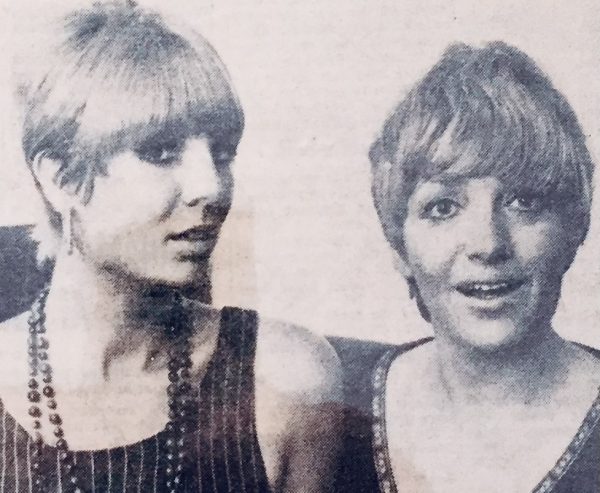
Robin Tyler (R) with Pat Harrison, an out lesbian comic team that was making waves as far back as 1970. (Photo courtesy Robin Tyler)
Tyler persisted, and her passion led her to activism, where her contributions are likely well known to many Blade readers. She organized and produced the first three national marches on Washington for LGBTQ+ rights, including 1987’s “mock wedding” of hundreds of queer couples; she and her future wife (the late Diane Olsen) were the first couple to sue the state of California for the right to be married – leading to the 7-year legal battle which culminated in Marriage Equality. If you are currently in a same-sex marriage in the United States, you have her to thank.
We spoke to her about the film and her legacy, and, as always, she pulled no punches. Our conversation is below.
‘Outstanding’ highlights your removal from “prime time” as a setback for queer visibility, but do you still think of it as a setback for your career?
“You know what? Everybody says ‘Oh, she gave up this career, she could have been a star,’ but what they mean is I could have gotten mainstream acceptance. It’s like saying to Richard Pryor, ‘If you didn’t tell the truth, maybe white people would have loved you.’ The best thing that happened to us is that we didn’t get picked up, because then we could go and be free. It takes your life away, having to live a lie. We gained our freedom and lost nothing.
“I don’t care about mainstream acceptance, if it means being in the closet. Don’t forget, 75 million Americans are MAGA supporters. To me, that’s the mainstream.”
As an organizer, you spearheaded the fight for Marriage Equality. How did that happen?
“In 1987, two men from L.A. wanted me to do the ‘mock wedding’ as part of the ’87 march on Washington. I took it to the board – there’s always this board of 68 people, it’s different people, but the same attitude, with every march – and they voted it down. They said, ‘no one’s interested in marriage,’ and I said ‘fine’. And I did it anyway, and 5000 people came. Obviously it was an issue we were interested in.
“It was also interesting that a march board would try to decide what people want or not. Well, we did want it, and we got it, now.”
And yet, it seems we’re still fighting for it.
“I agree, and I think with this Supreme Court we’re in trouble – but passion is much better than Prozac, so we need to keep aware and be ready to get into the streets again. We can’t just be ‘armchair activists’ on the internet, you know? Because then we’re just reading to each other.”
It does seem that the internet has made it easier for us to live in our comfortable bubbles.
“Yeah, but I’m an organizer, and it’s wonderful for that. I was the national protest coordinator when we stopped Dr. Laura [Schlesinger, the anti-LGBTQ talk radio ‘psychotherapist’ whose transition to television was successfully blocked by community activism in the early 2000s], and we did all the demonstrations locally. We worked with a guy who knew the internet, and we were able to send out information all over the country for the first time.
“I remember when we just had to go to parades and bars and baseball fields and had to leaflet everyone. This is easier. Less walking.”
Still, social media has become a space where “cancel culture” seems just to divide us further.
“That term was created by the Right. They can go ahead and say anything they want, but we get to not be called names anymore. At least we have a way to fight back. They call it ‘cancel culture’ and we call it ‘defending our rights.’
“And you know what? Even today, people like Dave Chappelle are doing homophobic jokes, and it’s not just that they’re doing it, it’s that these people sitting in the audience are still laughing at it. They still think they can get away with ridiculing us. You can always punch down and get a laugh. And why is it so bad, with people like Chappelle or Bill Maher? Because anytime you dehumanize anybody, when you snicker at them because you don’t understand, you’re giving other people permission to attack them. They’re attacking these people that are being brutally murdered, and they’re using humor as the weapon.
“We didn’t accept it in the seventies, so why are we accepting it now? And why aren’t we calling out Netflix for giving it a platform? It’s not enough to put out ‘Outstanding’ and showcase pro-gay humor. If a comic says something racist, their career is over, yet it’s okay for Chappelle to do homophobic stuff? What if I stood up and changed what he’s saying to make it about race instead of transgender people?
“And it’s not just about ‘right’ vs. ‘left’ anyway. Even with the Democrats in, they never deliver. Since 1970, they promised us a ‘gay civil rights bill’, and we still don’t have one. Why not? Democrats have held power in congress, the senate, the presidency, and they never pushed it through. We still can’t rent in 30 states, we can get fired; the United States is not a free country for queer people, and we must hold the government accountable. We have to fight for marriage separately, we have to fight for this and that, separately – and all it would take is one bill!
It’s been 54 years. Isn’t it time?
“We have to look at who our friends are – but don’t get me wrong, I’m still voting for Biden.”
So, how do we fix it?
“Here’s what I believe in: a woman walks into a dentist office, and he’s about to drill her teeth when she grabs him by the balls and says, ‘We’re not going to hurt each other, are we?’ I believe in that approach. Whatever they do to us, they need to know that there will be consequences.
“And also, at Cedars-Sinai they have just one channel in the hospital, and it’s comedy, because laughter is healing.
“Maybe we should we end on that?”
Online/Digital Streaming Media
Amazon Prime’s series ‘The Boys’ gets fascism
If the series points to what’s happening now in the world feels too blunt, perhaps it’s because it’s the blindingly obvious
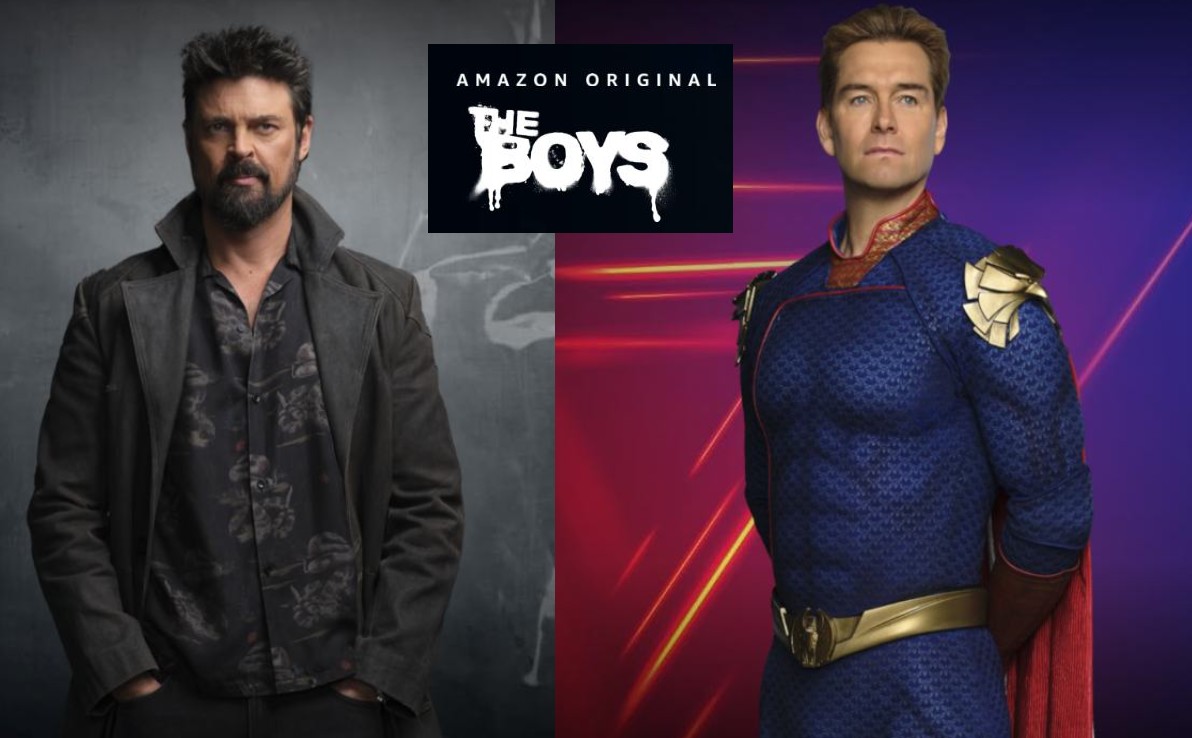
FAIRFAX, Va. – Perhaps nothing else in media gets the nature of modern fascism better than Season 4 of the Boys. For those who haven’t seen it, this Amazon Prime show is a gory, dark drama/comedy series about a world where superheroes are real, managed (fairly poorly) by a mega-corporation, and who are–for the most part–entirely awful human beings whose absolute power has corrupted them absolutely.
When the first season aired in 2019, its best moments were linked to events in the real world. Season 2 built on this, exploring how a world with actual Nietzschean supermen could devolve into fascism and fascist ideology.
Seasons 2 and 3’s primary antagonist superheroes were Homelander (imagine a Superman raised by white supremacists) and Stormfront (an actual German Nazi from WWII who was brought back from cryogenic stasis). The show’s reflection of the evils of the real world became more and more direct as the seasons progressed, but there was still a bit of a distance from reality. It was easy to treat Stormfront as something altogether different from modern Americans. A viewer could still see the evil character as a cartoonish relic from another country in a bygone age.
Season 4 of The Boys, however, has dispensed with even the pretense that it isn’t talking directly to the situation in the U.S. today. It asks the question, “what if Fascism came to America, and half the public really, really liked it?”
While some critics have panned the new season for its overly blunt analogies, they do reflect real life rather than science fiction. Our country is now seeing serious proposals that would normally be red flags.
We have politicians supporting things like the mass arrests of political opponents; open discussions of seizing power for generations; the institution of a state religion; the eradication of transgender people; the execution the former chairman of the Joint Chiefs of Staff for treason; and dispensing with the constitution. And yet, just like in the Boys, many people don’t see these ideas as a threat. In fact, some actively welcome them.
While I was watching the new season, I was struck by how many times I found myself ticking off things that I wrote about in my book, American Fascism, and in Jason Stanley’s How Fascism Works: The Politics of Us and Them.
The show fundamentally gets that, at its core, fascism is indeed the politics of us and them. Fascism frames everything as a fight between the good, pure herrenvolk against the atheistic, hedonistic profligates destroying the country; as a battle between the real Americans versus those who would destroy them.
At every opportunity, The Boys reminds viewers that corporations, the media, politicians, celebrities, and commentators will all ruthlessly exploit this for their own ends, even if many of them aren’t buying what they’re selling.
The show acknowledges this directly. Season 4’s new superhero villain is Firecracker, who’s basically a young and pretty female version of Alex Jones. She admits that she doesn’t actually believe the culture war conspiracy-theory baloney she peddles. It is transactional: her viewers get to feel outraged and powerful, and she gets the power.
Almost everyone in this fascist ecosystem is spouting vranyo, a Russian word which loosely translates as “useful lies that most people know are lies”, and the villains are fine with that. The outrage bait, and the rubes who do believe the vranyo, give them that power.
While watching Season 4’s first three episodes, I was often surprised by the writers’ familiarity with, and understanding of, fascism’s less obvious aspects. In one episode the megacorp Vought puts on an Ice Capades-style show whose theme is that saying “happy holidays” is a war on Christmas and Christians…but does so in a smiley-happy upbeat way, complete with music in a major key.
This is a classic example of the phenomenon described in Hacker and Pierson’s book, “Let Them Eat Tweets,” where corporations exploit cultural grievances to build political movements friendly toward their own bottom line. The book draws a direct line between right wing populist movements and the corporations using them as a vehicle to put politicians in place who will ensure the government takes a very hands-off approach to their shenanigans (and profits).
The show’s writers get the difference between istina (the real truth), pravda (the truth we create), and vranyo. They fundamentally understand how news outlets can create pravda with the “firehose of falsehood” model. The news media in The Boys is 100% on board with fascism, with some of the parody hardly being parody at all.
When three pro-superhero dupes are murdered (by superheroes), the corporate-controlled media in the show blames it on “socialists”, while elevating the deceased to martyrdom. It’s not hard to see shades of Horst Wessell in this.
The Boys also understands that “us versus them” fascism requires an enemy, ideally “enemies [who] are at the same time too strong and too weak,” as Umberto Eco wrote in his essay on Ur-Fascism. He was referring to Jewish people when he wrote it in 1995; but in Season 4 of the The Boys, the writers correctly identified the .5% of the population in the US that meets Eco’s criteria for targeting by fascism: transgender people.
As Eco noted, “Ur-Fascism grows up and seeks consensus by exploiting and exacerbating the natural fear of difference. The first appeal of a fascist or prematurely fascist movement is an appeal against the intruders.”
When we meet Firecracker at a convention for conspiracy theorists, she tells her gullible and adoring audience that Tom Hanks and Oprah Winfrey are operating a secret child trafficking ring that will home-deliver “a child forced to have trans surgery.”
Later, when Homelander is whipping up a crowd, he tells them that “They want to replace you with some Godless, non-binary socialist like them. Their depraved leader commands it.” He next tells the crowd that “we are the defenders of real Americans.”
After the rally, Fircracker tells reporters, “”If she (a protagonist) really cares about women, why does she let these transgenders into girls’ bathrooms?” The Boys is perhaps the only mass market media to have correctly recognized that fascist movements globally have zeroed in on transgender people as their primary target.
The pairing of superheroes and fascism is a natural one, too. Eco noted that, “in [fascism] everybody is educated to become a hero. In every mythology the hero is an exceptional being, but in Ur-Fascist ideology heroism is the norm.” It’s almost certainly not a coincidence that completely amoral, vain, petty, narcissistic, thin-skinned, fascist Homelander repeatedly tells his audiences of adoring fans, “You’re the real heroes,” without believing a word of it.
Homelander sees people as “toys” who exist only to boost him to his rightful place as ruler. Umberto Eco perfectly captured Homelander’s attitude towards people: “the Leader, knowing that his power was not delegated to him democratically but was conquered by force, also knows that his force is based upon the weakness of the masses; they are so weak as to need and deserve a ruler.” At the same time, the masses who support Homelander and his aspirations believe that they are the best sort of “real Americans.” Or, as Eco put it, “the members or the party are the best among the citizens.”
Even the gory, blood-soaked tone of the series captures an important element of fascism. In Robert Paxton’s 2005 book The Anatomy of Fascism, he describes how a key characteristic of fascism is the beauty of violence when dedicated to the group’s success. Fascism glorifies this violence and disdains existing legal restrictions on their exercise.
In Season 4, the baddies deliberately amp up tensions and hostility to spur their supporters to even more violent acts directed against the opponents of superheroes. All the while the mob is dressed in red, white, and blue.
The Boys explores a world where the Nietzschean supermen are free to use unspeakable levels of violence for petty personal reasons and in pursuit of power, without repercussions. It directly answers the question of what could happen if a leader with the personality of Homelander legally had the right murder anyone they wanted on a whim. Unsurprisingly it’s a dystopian bloodbath, with Homelander keeping those around him in line with violence and extreme levels of intimidation.
The more I watched, the more it became abundantly clear that the writers of The Boys get fascism at a fundamental level. Whether they have read Hacker, Pierson, Stanley, Eco, Paxton, or even me (I apologize if they did), I don’t know. Regardless, they capture so many of the crucial underlying aspects of a fascist movement.
If the show’s analogies to what’s happening now in the real world feel too blunt, perhaps it’s because they’re merely pointing out the blindingly obvious.
Season Four of The Boys is now streaming on Amazon Prime.
Online/Digital Streaming Media
‘Making Gay History’: Podcast remembers Stonewall 55 years later
One New Yorker is making sure that the events leading up to one of the most pivotal points of gay and American history are remembered
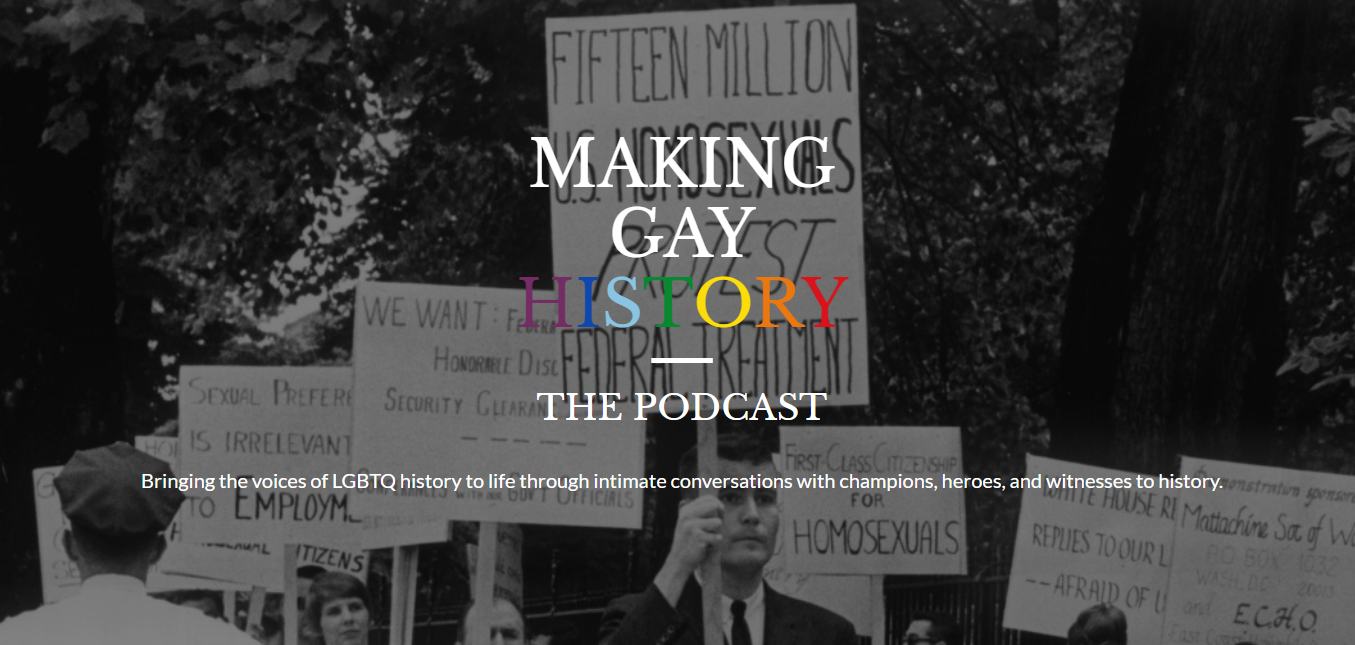
By Gus Rosendale | NEW YORK, N.Y. (NBC 4 New York) – This month is the 55th Anniversary of the Stonewall uprising and one New Yorker is making sure that the events leading up to one of the most pivotal points of gay and American history are remembered through a podcast called “Making Gay History”.
Watch:
Editor’s Note: Making Gay History is a 501(c)(3) nonprofit organization that addresses the absence of substantive, in-depth LGBTQ+-inclusive American history from the public discourse and the classroom. To learn more go here: (Link)
Online/Digital Streaming Media
Groundbreaking Japanese romance reality series ‘The Boyfriend’
What relationships will develop after a summer together? The new Netflix series ‘The Boyfriend’ streams on July 9
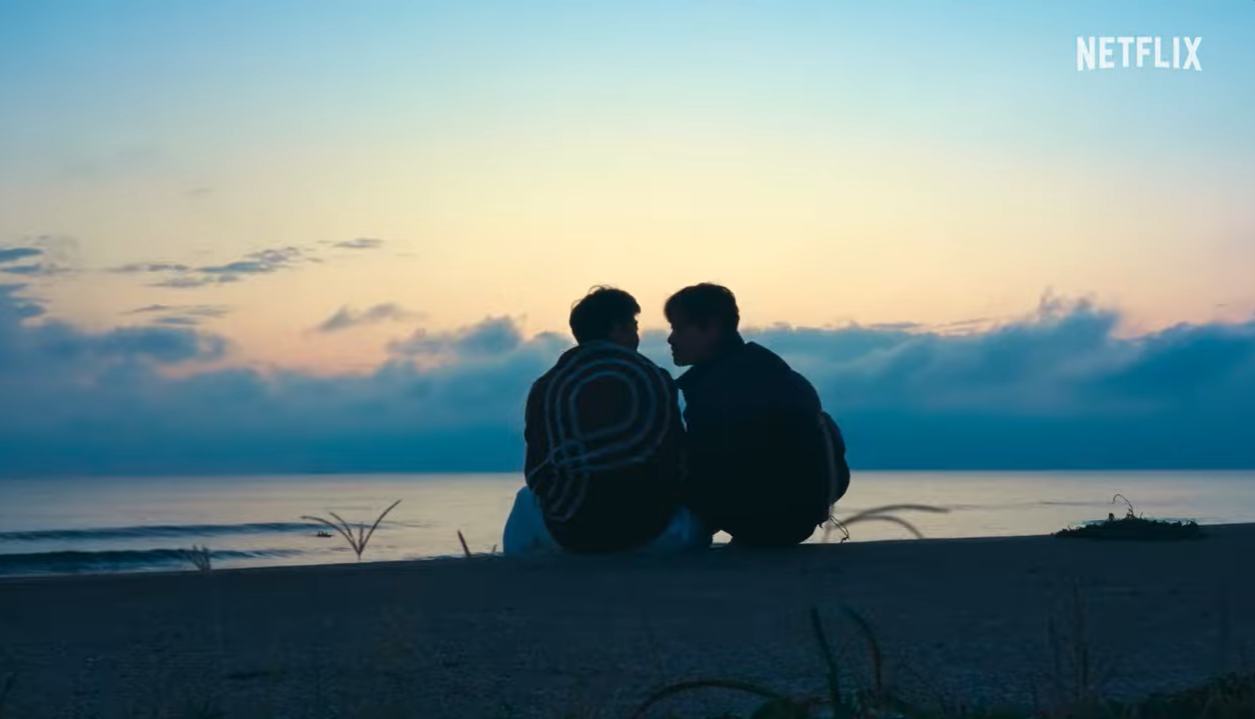
TOKYO, Japan – Blazing a fresh trail in the reality dating genre, The Boyfriend, Japan’s first same-sex romance reality series, celebrates love in all its forms. Starting July 9, Netflix viewers can tune in every Tuesday to enjoy a total of 10 episodes in four weekly installments.
Located by the sea, the “Green Room” beach house sets the stage for nine men to find love. For a month, they live together and take turns working shifts at a peppermint green coffee truck, forging deep friendships and learning about themselves along the way. Hosted by an eclectic mix of personalities including MEGUMI, Chiaki Horan, Thelma Aoyama, drag queen Durian Lollobrigida and Yoshimi Tokui, the show promises to deliver a rollercoaster of emotions.
Executive producer Dai Ota, manager of live-action originals at Netflix Japan, shares the vision for the series, explaining, “We started out wanting to highlight the young men’s friendships and personalities. Our focus wasn’t just on romance but also on spending time together and experiencing personal growth.”
Kyodo Television’s Keisuke Hishida (Ainori Love Wagon: Asian Journey, Love Deadline), who serves as the chief producer and director, adds, “I discussed with the cast how growth and valuable experiences stem from shared friendships, youth and struggles, not just romance. This led to many unexpected miracles on set.”
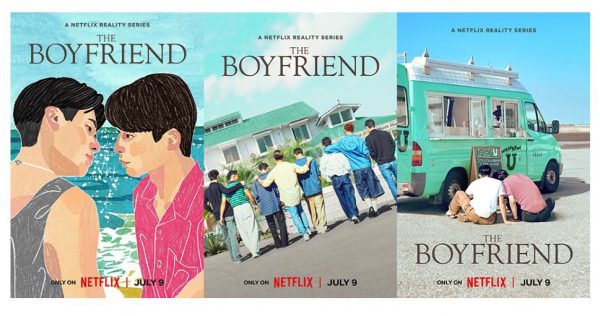
Model, DJ and YouTube vlogger Taiki takes on the roles of producer and casting director. On bringing the charismatic group together, he says, “I’m so happy with how this series took shape. I listened to each participant with a goal to produce a show that left everyone feeling valued and loved.”
The series debuts a heartwarming teaser trailer featuring the song “Dazed & Confused” by Korean indie rock band Glen Check. Three teaser posters, including one illustrated piece by Korean artist Son Eunkyoung, are also released.
What relationships will develop after a summer together? The Boyfriend streams on July 9, only on Netflix.
Watch the teaser trailer:
Online/Digital Streaming Media
Deliciously queer ‘Dead Boy Detectives’ a case worth taking on
A light-hearted, smart, and complex sensibility behind the fantasy

Believe it or not, there was once a time when the Hollywood entertainment industry didn’t take comic books very seriously — but then, neither did anyone else.
In the early days, comics were dismissed by most adults as childish fantasy; indeed, those with a penchant for clutching pearls saw them as a threat to their children’s intellectual development and therefore to the future of America itself. Their popularity could not be denied, however, and Hollywood, ever eager to capitalize on a trend, was certainly hungry to get a piece of the action.
The problem was that the studio lackeys assigned to adapt the comics for the screen during those “golden years” were never actually fans of the comics themselves. The result was a parade of kitschy – if occasionally stylish – low-budget serials, kiddie matinees, and “B movies” which operated, for the most part, at the level of cartoons, and mindless ones at that. Even in the 1960s, when comics like “X-Men” had begun exploring mature themes and turning the comic book into a counterculture phenomenon, the best that Hollywood – now deploying the then-relatively new medium of television – was a “Batman” series that felt even campier than the corny serials of three decades before.
Yet despite being treated as a throwaway genre with no cultural significance or intellectual value, the popularity never went away – and with the generation that grew up with comics now old enough to be working in Hollywood themselves, a new burst of creativity began to infuse the screen’s version of the genre with the kind of nuance and sophistication that fans had always known was there. Fast forward to 2024, when comics-based content dominates not just our movie screens – nobody needs to be told about the way it has shaped (some would say crippled) the mainstream film industry for the last decade or so – but all our other screens, as well. And while much of the material that has resulted from this obsessive fascination with comics (and comics-adjacent material like “Star Wars” and other similar fantasy franchises) often suffers from the same safe “appeal to the LCD” mentality that robbed the vintage stuff of its potential, the artistry of creators who are fans themselves has also resulted in a lot of genuinely good storytelling.
In the latter category, we offer up “Dead Boy Detectives” – a new series derived from a supplemental thread in renowned comics creator-turned-bestselling author Neil Gaiman’s groundbreaking “Sandman”, which debuted last week on Netflix – as a counter to the increasingly popular notion that comic books have hamstrung the industry’s creativity.
Based on characters and storylines that emerged during the original run of Gaiman’s iconic book (published by DC Comics via its Vertigo imprint), it’s a fresh, funny-yet-emotionally engaging supernatural saga in which two ghosts who died in their youth – the titular “Dead Boys” – operate a detective agency in London, solving mysteries for other spirits who need closure before moving on to the afterlife.
The boys – Edwin (George Rexstrew) and Charles (Jayden Revri) – are not themselves quite ready to depart the earthly plane, however; on the contrary, they operate on the lam, making sure to keep one step ahead of Death (Kirby Howell-Baptiste, reprising her role from Netflix’s acclaimed “Sandman” adaptation) so that she can’t drag them out of it before they’re ready. Something of a mismatched pair (both died at the same English boarding school, but 60 years apart), they nevertheless have established a fondness for each other and a dynamic together that makes them an excellent team in solving the supernatural crimes they encounter in their work. Their biggest handicap is the difficulty of dealing with the living – who, for the most part, cannot see or hear them – when it becomes necessary in an investigation. Fortunately for them (and for the story, of course), they find a solution to that issue during episode one.
Enlisted by the ghost of a Victorian child to rescue the human medium – Crystal Palace (Kassius Nelson), possessed by a former boyfriend who was actually a demon (David Iacono) – that has been trying to help her “cross over”, the detectives find themselves with a living ally who can not only interact with them, but also with the “real” world in which they do their work. With Crystal on the team, they are soon called to an American seaport town to investigate the disappearance of a child – who, it turns out, has been abducted by a witch (Jenn Lyon) intent on draining her youthful essence in pursuit of her own immortal beauty. We don’t want to give anything away, but during the course of the case they not only incur her wrath, they set off alarm bells on the “other side”, calling attention to the fact that two AWOL souls are still lingering in the human world.
Things get worse for them in the second episode, when Edwin attracts the interest of the local “Cat King” (Lukas Gage, “White Lotus,” “Down Low”) and subsequently finds himself cursed to remain until he has “counted all the cats” in town – a daunting and maybe impossible task.
Though jumping into the second installment might feel like getting ahead of ourselves, it’s important to look ahead for the sake of exploring the show’s deliciously pervasive queerness, so forgive the spoiler-ish leap; because it is Edwin, who died in an era long before being openly attracted to other boys could even be discussed, let alone accepted, that serves to root the story’s tension into a real-life context that helps all the supernatural nonsense connect with relatable real-world experience and emotion. Uncomfortable more than a century after his death with the secrets of his own sexuality, he finds himself hampered by his jealousy of the obvious growing attraction between his literal BFF and the new girl psychic who has joined their team – as well as vulnerable to manipulation from both the witch who has it in for him and the Cat King who… well, let’s just say that Edwin’s cat-counting curse could be easily lifted if he would only accept another way to appease the libidinous (and far from unappealing) feline monarch.
It’s best we stop there, before we reveal too much; the series – developed by Steve Yockey and produced by (among others) original author Gaiman and out queer TV impresario Greg Berlanti – sets up its story arc very plainly from the beginning, so savvy viewers will read the subtext long before any definitive events take place, but much of what makes it fun is watching how it all unfolds.
Suffice to say that, with engaging performances from all its players, a light-hearted, smart, and complex sensibility behind all of its fantasy elements, and a palpably queer vibe that leaves plenty of room for allies to jump on board, too, it’s one of the more worthwhile (and meaningful) “comic book” stories to hit our screens in a long while.
Maybe more importantly, it’s also entertaining, which makes it easy for us to recommend “Dead Boy Detectives” as a case you’ll definitely want to accept.
Online/Digital Streaming Media
Delivering a 25-year-old gay lost love letter across time & distance
Los Angeles Blade contributor and gay YouTube vlogger ‘StanChris’ delivers a 25-year-old love letter across the Atlantic
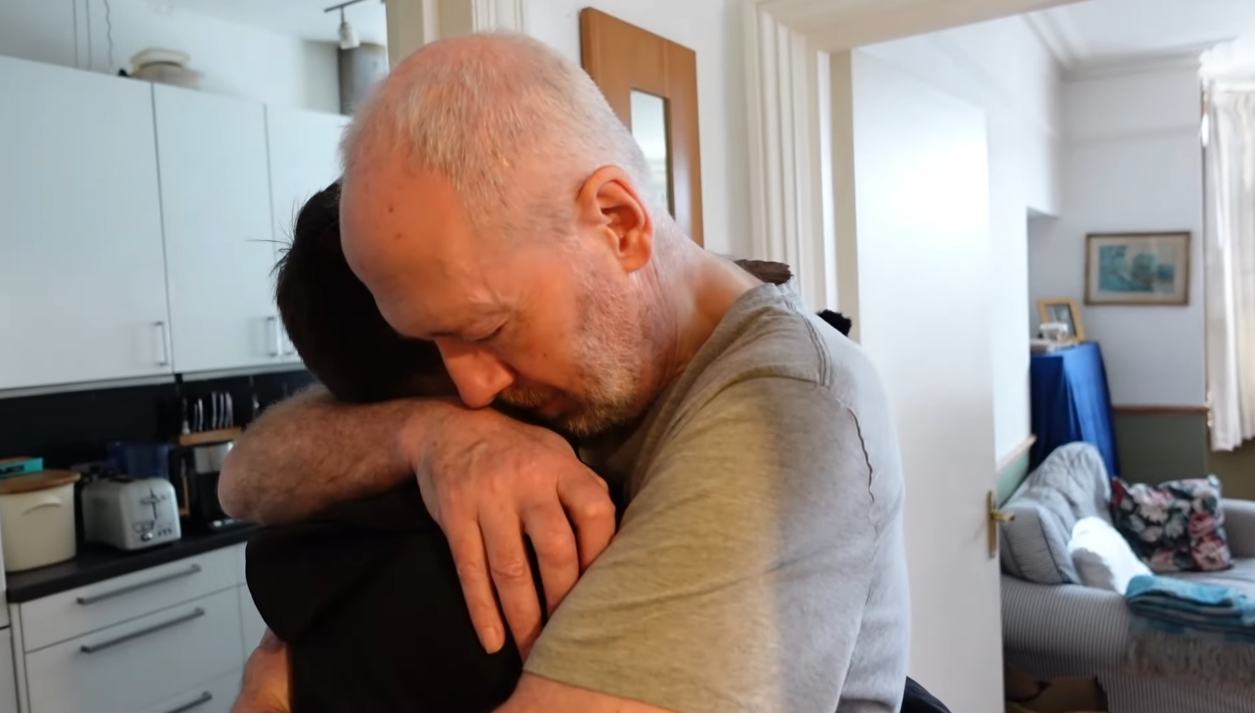
By Chris Stanley | BOSTON, Mass. – Celebrating one of my younger brother’s birthdays I took him thrifting a few months ago and while we were in an antique marketplace exploring, he found an interesting item in a bureau that ended up being a modern day adventure- in the name of gay love.
Please watch my videoblog below oh and at the end, especially for you folks living on the West coast, I have a special request for your assistance.
******************************************************************************************
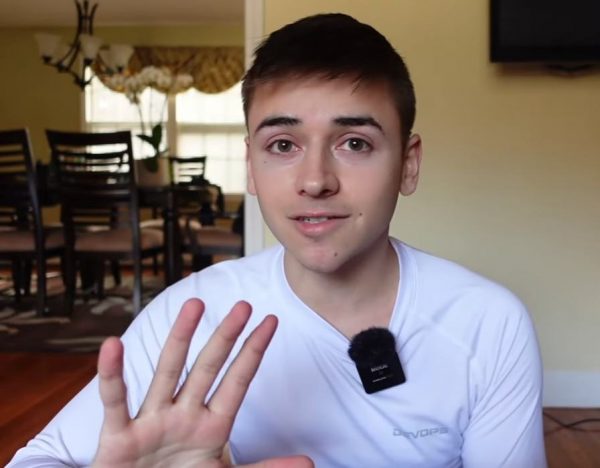
Chris Stanley, a contributor to the Los Angeles Blade, is a Boston-based YouTube vlogger and social media influencer with 400K plus followers. He is also on TikTok and Instagram as ‘StanChris’ and along with his best mate, fellow vlogger and influencer Artem Bezrukavenko @itsartbezrukavenko, document their lives, capturing stories and their interactions in the LGBTQ+ community.
Online/Digital Streaming Media
The trans man, journalist, & filmmaker embedded with the Taliban
New documentary TRANSITION presents an astounding scenario with depth and sensitivity by documentary filmmaker Jordan Bryon

HOLLYWOOD – Imagine taking this plot into the creative meeting at a major studio: “It is right before the Taliban take control of Afghanistan. A transgender journalist has been living in transition. He becomes embedded with a group of Taliban warriors – and gets to know them. Here’s the kicker—he even goes and gets his gender-affirming surgery WHILE being embedded.”
You can hear imaginary murmurs from the theoretical executives. “Nah, who would DO that?” “Implausible. They would get found out.” And a third, “No. No one would believe that could happen.”
They might determine that it tries to create a truth that no one will believe.
As it turns out, they, and you, CAN believe it, because it happened. It has already been turned into a film, but not a dramatized fictional one – it is now a documentary. The documentary not only gives you the experience of a transgender activist embedded, and in action, but equally astounding, it was made by a woman. If you know anything about the Taliban, you will know that a woman wielding a camera around them is hard to fathom.
The film is ACG Unwritten’s “Transition,” released through Gravitas Ventures. In the film, Australian trans man, journalist, and filmmaker Jordan Bryon gains incredible access to a Taliban unit during the fall of Afghanistan. While he is in his own personal transition, so is the country around him. As he and his local videographer, Teddy, embed with the Taliban, Jordan conceals his physiology and is accepted as a man. If the Taliban had found out, he and Teddy would have been stripped and killed. In the film, Jordan struggles with the moral and ethical dilemmas that come with his unique situation. “Reality is far more complex that ‘this is the way things are.’ We wanted to find humanity in dark places, we wanted to explore the gray areas.”
I sat down with Jordan and his filmmaker partner, Monica Villamizar, on the podcast Rated LGBT Radio and the episode The Trans Man Who Embedded with the Taliban: The Hot New Doc TRANSITION. The film is a mind-blowing chronicle of personal transition played out against the backdrop of a cultural one. It still begged the question, why would a nice trans man like Jordan, raised and supported by a gem of a mom back in Australia (we meet her in the film), subject himself to the danger and potential vitriol he would have encountered had he been discovered, or even suspected of being trans?
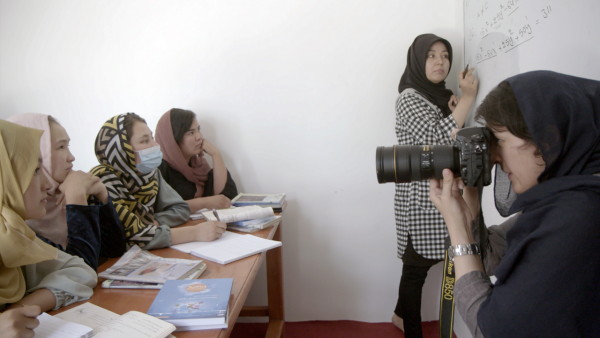
“It’s wild. I experienced a lot of discrimination and even violence in Australia because I always had these labels that followed me around. When I went to Afghanistan, because they have such a limited understanding of LGBTQ people, I was anonymous. They didn’t really know if I was a man or a woman, so I became just ‘Jordan” and that anonymity really gave me a blank slate to reimagine myself as to who I wanted to be in the next chapter of my life. Obviously, I am talking as a privileged Australian. For Afghan LGBTQ people, it can be a fatal experience,” he answers. Jordan had been in Afghanistan for five years before it fell to the Taliban. He was not willing to let that “small” fact deter him, when he still had so much more he wanted to give back by revealing the true Afghanistan to the world.
“I am a documentary filmmaker,” he tells me. “Like all of us documentary filmmakers, I am on the hunt for stories that are going to give the audience insight into something they may not know that much about. My mom, you met her in the film, is a bloody legend. She raised me to always speak out for the underdog. Having always been an underdog myself, growing up queer in a small rural town in Australia, I’ve always had an underdog affiliation. I’ve lived in Jordan, Palestine, and Afghanistan, all underdog countries. Making films in these countries, especially Afghanistan, is an absolute gift. Afghanistan is largely undiscovered in many ways and the headlines we see in the media are only one dimension of the country. It is a complex, multi-dimensional country that blows your mind the more you get to know it. Being a filmmaker in Afghanistan is the best chapter of my life I have ever had.”
As to his own identity, Jordan says, “I love being trans. I do not see myself as being a man or a woman. I see myself as being a cluster-fuck of both and everything in between. “ While Joran has gender-affirming surgery in the film, he still celebrates the decades that he lived as a nongender individual within a female presenting body.
For her part, Monica felt a responsibility as a journalist to capture this piece of history, even though she did not have the same privilege that Jordan experienced. A paradox of the film shows is how Jordan gains more freedom in this toxic masculine world as he transitions, than Monica. The film deftly chronicles the increasing oppression of women as the Taliban transitions to power. Monica experiences this firsthand as her freedoms become more limited operating behind the camera. “I was with Jordan, Kiana, and Teddy for some of the filming where I could have freedom of movement as a woman, but when Jordan was traveling with the Taliban unit, but when they went remote, I had to stay back in a hotel. They had to go through various Taliban checkpoints where I could not be in the car, I could not be seen because I am a woman. I was locked up in a hotel, communicating with the crew via telephone messages.” Even with those restrictions, through the team, Monica was able to capture film that showed Afghanistan in way no one around the world had seen before.
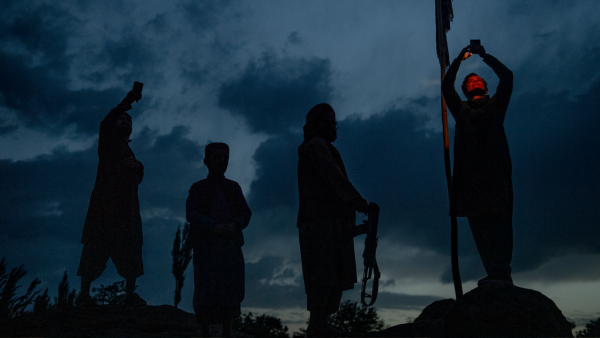
Monica points out the most unique aspect of the film: getting a reporter’s viewpoint through a nonbinary lens. She calls out the journalism establishment that has female reporters covering one kind of story, and male reporters who are very “gung ho” covering others. Here you have a nonbinary reporter’s vision being captured. “How Jordan approached people was so interesting. More rich. We wanted to explore these complexities and nuances. How Jordan disarms the Taliban members with his personality, it is very interesting. We would not have gotten that kind of footage and intimacy through another reporter’s eyes.”
Transition is a film about a country being regressed to its prior oppression. It is a film about one man’s transition into his more finely honed authenticity.
Mostly though, it is a film that will impose a transition on you, the audience member. It will take you from pre-conceived notions about both situations to a deeper more multi-dimensional understanding.
Therefore, Transition is ultimately about truth. Afghanistan’s truth. Jordan’s truth.
And the truth each one of us chooses to see and believe in the world.
Transition had its world premiere at the Tribeca Festival to audience and critical acclaim and has captivated audiences around the world as an Official Selection at Sheffield DocFest, Sydney Film Festival, International Documentary Film Festival Amsterdam (IDFA), Watch Docs Festival and the Human Rights Film Festival where it won the Audience Award.
You can view it on all on-demand platforms.
*****************************************************************************************

Rob Watson is the host of the popular Hollywood-based radio/podcast show RATED LGBT RADIO.
He is an established LGBTQ columnist and blogger having written for many top online publications including The Los Angeles Blade, The Washington Blade, Parents Magazine, the Huffington Post, LGBTQ Nation, Gay Star News, the New Civil Rights Movement, and more.
He served as Executive Editor for The Good Man Project, has appeared on MSNBC and been quoted in Business Week and Forbes Magazine.
He is CEO of Watson Writes, a marketing communications agency, and can be reached at [email protected]
Related:
Online/Digital Streaming Media
Pornhub blocks Texans accessing site over age verification law
The Fifth Circuit Court of appeals partially vacated the original injunction ruling that the age verification requirements are constitutional
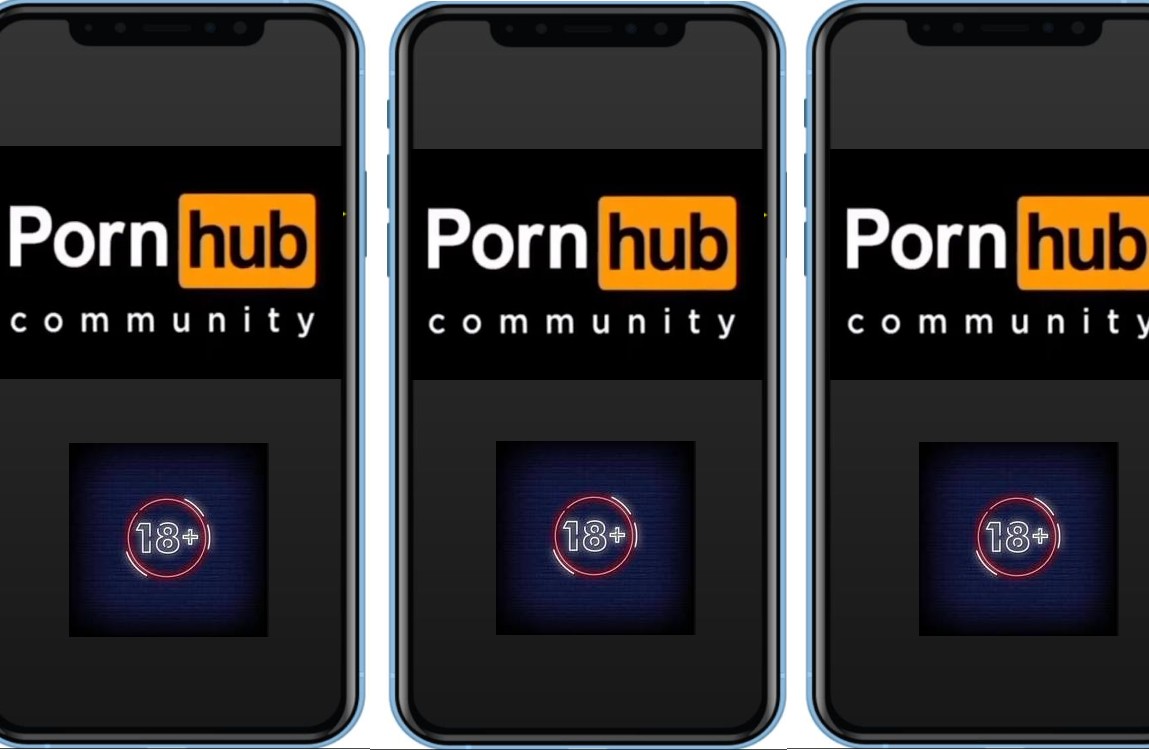
MONTREAL, Canada – Aylo (formerly MindGeek) the largest global adult online entertainment conglomerate, owned by Canadian private equity firm Ethical Capital Partners, has restricted access to its platforms including its flagship Pornhub in Texas after a court battle forces the state’s age verification law to take effect.
Texas Republican Attorney General Ken Paxton had appealed a U.S. District Court decision that enjoined him from enforcing HB 1181. Paxton and others argued that purveyors of obscene materials online needed to institute reasonable age-verification measures to safeguard children from pornography.
A week ago the U.S. Court of Appeals for the Fifth Circuit partially vacated the original injunction, ruling that the age verification requirements are constitutional.
“Applying rational-basis review, the age-verification requirement is rationally related to the government’s legitimate interest in preventing minors’ access to pornography,” the 3 judge-panel of the Fifth Circuit Court explained. “Therefore, the age-verification requirement does not violate the First Amendment.”
While the court vacated the injunction against the age-verification requirement of the statute, it upheld the lower court’s injunction against a separate section of the law that would require pornography websites to display a health warning on their landing page and all advertisements.
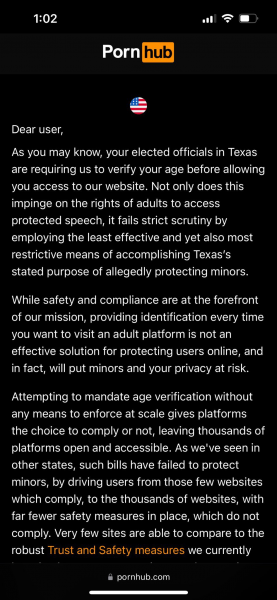
The Houston Chronicle reported people who go to the site are now greeted with a long message from the company railing against the legal change as “ineffective, haphazard, and dangerous.” The company calls for age verification by the makers of devices that let people on the internet, instead of individual websites.
Age verification legislation was enacted in several states in 2023 in addition to Texas, including North Carolina, Montana, Arkansas, Louisiana, Mississippi, Utah, and Virginia.
The new laws require users to provide digital confirmation via a certified approved third party vendor like London-based digital identity company Yoti. The other possibility would be a state approved digital ID such as the California DMV’s Wallet app, which contains a mobile driver’s license.
Users accessing Pornhub from within Louisiana are presented with a different webpage that directs them to verify their age with the state’s digital ID system, known as LA Wallet. The law passed in 2022 subjects adult websites to damage lawsuits and state civil penalties as high as $5,000 a day if they fail to verify that users are at least 18 years old by requiring the use of digitized, state-issued driver’s licenses or other methods.
The Associated Press reported this past October that an adult entertainment group’s lawsuit against a Louisiana law requiring sexually explicit websites to verify the ages of their viewers was dismissed by U.S. District Judge Susie Morgan in New Orleans.
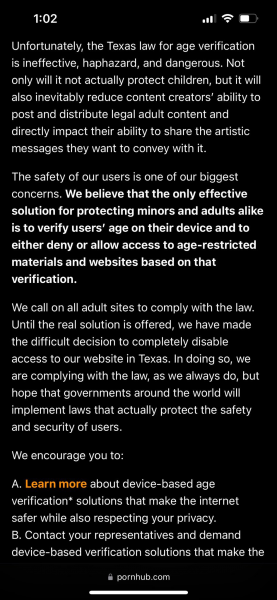
Potential or existing Pornhub users in North Carolina and Montana are directed to a video that features adult film star Cherie DeVille, who recites a message also written under the video.
“As you may know, your elected officials in your state are requiring us to verify your age before allowing you access to our website. While safety and compliance are at the forefront of our mission, giving your ID card every time you want to visit an adult platform is not the most effective solution for protecting our users and in fact, will put children and your privacy at risk.”
“Mandating age verification without proper enforcement gives platforms the opportunity to choose whether or not to comply,” the statement continues. “As we’ve seen in other states, this just drives traffic to sites with far fewer safety measures in place.”
“Until a real solution is offered, we have made the difficult decision to completely disable access to our website in [the aforementioned locales]” the message ends with.
The company previously blocked Utah on May 7, 2023. CNN reported at the time:
Affected users are shown a message expressing opposition to SB287, the Utah law signed by Gov. Spencer Cox in March that creates liability for porn sites that make their content available to people below the age of 18.
“As you may know, your elected officials in Utah are requiring us to verify your age before allowing you access to our website,” the message said. “While safety and compliance are at the forefront of our mission, giving your ID card every time you want to visit an adult platform is not the most effective solution for protecting our users, and in fact, will put children and your privacy at risk.”
Courthouse News reported that after Virginia’s bill was passed in June, Virginia Senator L. Louise Lucas, a Democrat, criticized the state for not creating a system for age verification, and instead leaving it up to websites to manage the process, citing security risks.
“We passed a bill during this session to protect children from online porn. However the executive branch had an obligation to create a system for age verification,” Lucas said on X, formerly Twitter. “We will continue our work to keep pornography out of the hands of minors…but we will also work to ensure that this Governor’s error does not put the privacy of Virginians at further risk.”
Beyond the U.S. in the European Union, Pornhub and two more of the world’s biggest porn websites face new requirements in the European Union that include verifying the ages of users, under the EU’s Digital Services Act.
According to a December 20 report from the Associated Press, Pornhub, XVideos and Stripchat have now been classed as “very large online platforms” subject to more stringent controls under the Digital Services Act because they each have 45 million average monthly users, according to the European Commission, the EU’s executive branch.
They are the first porn sites to be targeted by the sweeping Digital Services Act, which imposes tough obligations to keep users safe from illegal content and dodgy products, the Associated Press reported last month.
In addition to the adult entertainment websites, any violations are punishable by fines of up to 6% of global revenue or even a ban on operating in the EU. Some 19 online platforms and search engines have already been identified for stricter scrutiny under the DSA, including TikTok, Amazon, Facebook, Instagram, Google and more.
Online/Digital Streaming Media
Netflix drops the trailer for the final season of Young Royals
The five first episodes of Young Royals season 3 will premiere globally on Netflix on March 11, closing off with the final episode on March 18
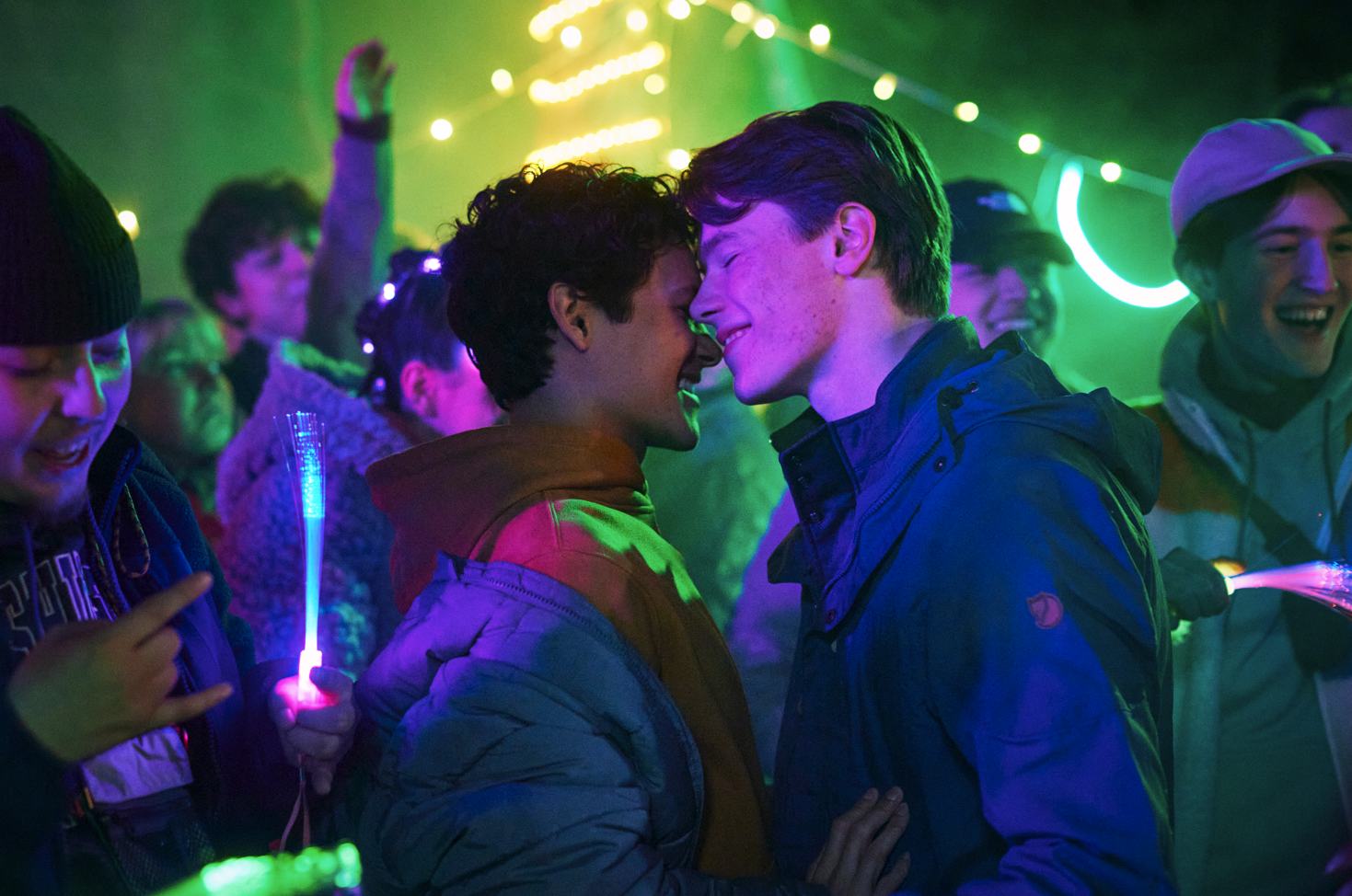
HOLLYWOOD – The five first episodes of Young Royals season 3 will premiere globally on Netflix on March 11, closing off with the final episode on March 18.
In Season Three, the final, Wilhelm’s speech has consequences not only in the court but also throughout the school, as Hillerska confronts the worst crisis in the school’s history. The prince and Simon are determined to be together, but what are they willing to sacrifice when realizing that their freedom and love might be at odds with the Royal ideals, traditions, and responsibilities?
Creators: Lisa Ambjörn, Lars Beckung and Camilla Holter
Directors: Julia Lindström, Jerry Carlsson, and Linnéa Roxeheim
Writers: Lisa Ambjörn (head writer), along with Tove Forsman, Sofie Forsman, Pia Gradvall, Ebba Stymne, and Theo Boguslaw
Producers: Lisa Berggren Eyre and Martin Söder for Nexiko
Executive producer: Lisa Ambjörn and Lars Beckung
Key cast: Edvin Ryding, Omar Rudberg, Malte Gårdinger, Frida Argento, Nikita Uggla, Pernilla August among others.
-

 Theater5 days ago
Theater5 days agoGeffen Playhouse’s The Reservoir finds queer humor and joy in recovery and loss
-

 COMMENTARY3 days ago
COMMENTARY3 days agoUSAID’s demise: America’s global betrayal of trust
-

 a&e features4 days ago
a&e features4 days agoHow this Texas drag king reclaimed their identity through Chicano-inspired drag
-

 Obituary3 days ago
Obituary3 days agoThe queer community mourns the loss of trailblazer Jewel Thais-Williams
-

 Television2 days ago
Television2 days agoICYMI: ‘Overcompensating’ a surprisingly sweet queer treat
-

 a&e features5 days ago
a&e features5 days agoFrom Drag Race to Dvořák: Thorgy Thor takes the Hollywood Bowl for Classical Pride
-

 Arts & Entertainment4 days ago
Arts & Entertainment4 days agoMary Lambert Returns With a Battle Cry in new single, “The Tempest”
-

 Breaking News14 hours ago
Breaking News14 hours agoProject Angel Food loses $340,000 grant to feed people living with HIV
-

 Opinions1 day ago
Opinions1 day agoThe psychology of a queer Trump supporter: Navigating identity, ideology, and internal conflict
-

 Breaking News14 hours ago
Breaking News14 hours agoTrump administration sues California over trans student-athletes



